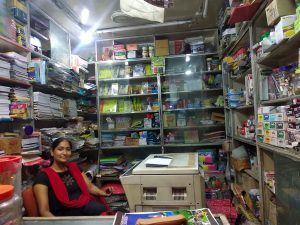People of Bharat: Nupur, Ranchi

Among the lesser known lanes of Ranchi stands a small stationary store surrounded by other shops selling a plethora of things. I am drawn to the only shop that has a woman running it, amidst all others. I walk up to her shop and greet Nupur Soni — a slender woman with a soft voice. Nupur talks to me in a pleasing tone — the tone that is characteristic of girls from small towns in India.
Nupur tells me that she is 45 years old. I don’t believe her; she looks much younger. She was born in Purulia, a small village in West Bengal, where her father ran a Fair Price Shop. While life was not rosy, it had a languid pace that offered some degree of predictability. Nupur tells me her father got her married when she was 20 and she eventually moved to Ranchi to stay with her husband and her in-laws after the wedding. She now lives with her 16 year-old daughter in a one-room house rented about two kilometers from her place of work.
Life after her wedding was promising. Nupur’s husband ran a stationary store and she helped him when she was free from her chores. Nupur completed her graduation after her marriage; she has a degree in Political Science. She proudly tells me how her husband had encouraged her to continue her studies and credits him for her degree.
A few years ago, Nupur’s husband was diagnosed with mouth cancer which had advanced to stage four. Her in-laws took a loan of about 3–4 lakh rupees. They tried many doctors and treatments, but were unable to save him. ‘Bahut jyaada toh kuch nahi kar paye, kahe ke (cancer) fourth stage me tha.’ (We couldn’t do much as the cancer had already advanced to the fourth stage), she continues in a matter-of-fact tone, her soft and steady voice does not waver.
Her husband passed away a little over a year ago. I check my notes and ask her if her in-laws still live with her. She smiles. I am beginning to see something behind that smile when she interjects, ‘It’s a long story…after he (my husband) passed away, they changed. So, I took my daughter with me and left.’ Nupur tells me that she has no share in her dead husband’s property.
After leaving her in-laws’ house, Nupur found work at a stationary store. She feels that this was easier as she already had some experience in the area while working with her husband. The store owner pays her a monthly salary of Rs. 6–7,000. Nupur pays a rent of Rs. 2000 and spends about Rs. 2500 on groceries every month. Her daughter’s school fees and transport cost another Rs. 1200. Nupur has a TV, refrigerator and a gas connection. A quick glance at my notes makes me realise that after paying for electricity and gas, she is not left with much to save.
When Nupur started working, she would prefer keeping the extra cash saved at home despite having a bank account. Her mother has consistently advised to save her money in the bank or post-office savings as she could also earn a small interest on the deposits. Nupur tells me that she manages to save Rs.500–1000 each month which goes into any one mode of saving. She owns a smartphone but doesn’t use it much except for phone calls. Her daughter often uses it to play games and surf the internet.
Nupur’s typical day starts at 6 AM. She cooks breakfast, packs her daughter’s tiffin, sees her off to school, and finishes other chores before going to the shop at 10 AM. She returns in the afternoon to have lunch with her daughter. Nupur closes the shop at 7 PM, returns home and cooks dinner while her daughter finishes her homework. Then they have dinner and go to bed. The routine goes on and the days wear off; ‘Aise hi din kat jaata hai mera’. (This is how I pass my days).
Nupur has no intentions of switching her job; she feels this to be a comfortable choice for her. She feels life is hard and she has to cut corners to be able to live the way she does. ‘Bahut soch samajh kar chalna padta hai.’ (I have to be prudent in my spendings). Nupur aspires to have a house of her own in her native village someday. Since she is a widow, I notice her not wearing any jewelry and get tempted into asking her whether she owns any gold. She tells me she has two gold bangles that her mother had bought for her when she got married. ‘Woh toh bahut hi patle patle hain. Abhi kuch das pandrah hazaar ke honge.’ (They are extremely slender bangles. Their values now must be about 10–15,000 rupees).
Nupur feels her husband’s death caused a turn of events where everything went against her. ‘Humko bahut dukh hai. Woh rehte toh bahut accha rehta; hum sab kuch nahi kar pate.’ (Losing him has left me in pain..Things would have definitely been better if he were alive. I can’t manage everything alone). Her factual tone devoid of any emotions, leaves me in awe of her.
Despite her difficulties she does not communicate any bitterness for her circumstances or the people closest to her who let her down. Her daughter wants to become a doctor someday and Nupur hopes to support her education and her aspirations. ‘Beti ko padha ke apne pairon pe khada karna chahte hain; ki aisa uske saath na ho’. (I want to educate my daughter and make her independent so that she never has to face what I had to endure.) She speaks in the same unemotional tone.
‘…treat those two imposters just the same.’ Here in the dusty lanes of Ranchi, I meet in Nupur the personification of what Kipling wrote, in a far removed land.
This research was developed as part of the Bharat Inclusion Initiative.
